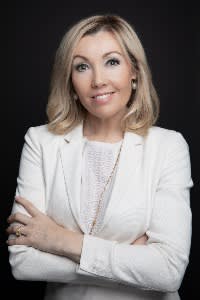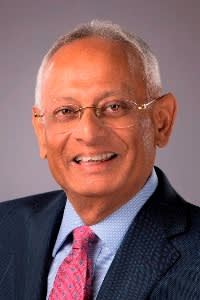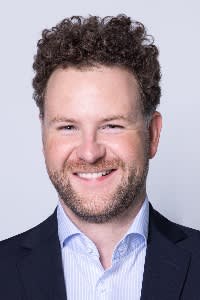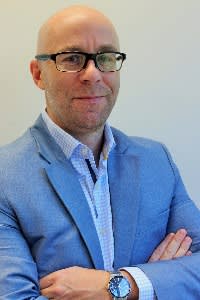[ad_1]
The growth of legal technology and its increasing importance is the result of many people’s innovations. But some of the field stands for vision and collaboration to create a sustainable legal practice around the world – each one is unique.
All have demonstrated impact, originality and leadership, but the panel of judges* honored Electra Japonas at TLB for its entrepreneurial work in developing OneNDA, an industry-standard agreement. By adopting technology and collaborating with multiple organizations, OneNDA presents a new model for innovation.
Working together
Electra Japan
CEO and Founder, TLB

© Adam Toth
Shortly after the start of the Covid lockdowns, Electra Japonas explored the concept behind OneNDA, a standard, open-source and free model for non-disclosure agreements. He led its development, working with law firms and internal legal teams.
After the start of the epidemic, “everyone is a little”, remembers Japonas, who in 2017, after ten years of domestic legal work, founded TLB – a company in London trading in legal design and management services.
However, no one thinks of OneNDA as “dark”. The OneNDA form has been downloaded more than 10,000 times and has been formally adopted by 650 companies. Importantly, its development path has provided “a blueprint for legal industry cooperation”, the FT said. while TLB is receiving a partnership award this year.
With the pandemic forcing many to abandon old ways, Japonas realized in 2021 that it could work with the domestic offices of its corporate customers and foreign law firms to solving the problem of NDA problem and increasing. He could offer the solution they developed for free and, at the same time, raise the image of TLB without “suffering for my services”, he said.
The idea of an NDA situation has been decided, which was intensified when Japonas posted on LinkedIn. The ad received 30,000 views, he said, and within 12 hours of launching the collaborative project, 100 lawyers had signed up. Within two weeks, the number reached 330 from 44 countries. Japonas was selected as a partner lawyer from leading companies and used those contacts to win the participation of the UK and US law firms.
“Our business really grew because of OneNDA,” Japonas said. “We’re now talking to companies that didn’t know we existed before OneNDA.”
The connection
Aine Lyons
Vice President and Senior Vice President, VMWARE

Aine Lyons expressed pride at an event organized last month by the Corporate Legal Operations Consortium, a network of legal professionals: “We’ve gone from playing on the sides of the industry to . . . creation,” he told Cloc’s audience.
Lyons’ career followed a similar arc. Having started twenty years ago among the rank and file in buildings, he now influences legal practice throughout the industry – as a founding board member of Cloc, he is the European leader now, and vice president of cloud software company VMware.
At VMware, he has restructured the back office, adopted new technologies, and inspired a team of more than 200 professionals to embrace those changes. During his ten-year tenure at the company, he has cut total administrative expenses as a percentage of revenue by 18 percent. He helped create VMware’s contract lifecycle, which cut the average duration by 25 percent. His preoccupation with these areas, he says, is “a human thing”.
Lyons knows that the most exciting change is going against the grain. “The law enforcement agencies are very strong – we can save the day by fighting fires,” he said. “But you also have to think about where you want to be in five years and create a plan, a mission, and a vision for the team.”
The archer
Shahzad Bashir
Founder and CEO, Morae Global

© D. Jones
Shahzad Bashir points to his Apple Watch, iPhone and iPad, quoting Steve Jobs. He wants to share his ambitions for Morae Global, the legal technology and services company he founded seven years ago.
As a general manager, his strategy is not only “to create solutions in the legal industry, each of which is the best solution in its field”, but also, like Apple products, to showing that “they do better if they work together.”
At odds with comparing one’s entrepreneurship to that of the late Apple co-founder, Bashir – a former Arthur Andersen consulting partner – Morae has a track record to trust. Its tools and services have helped clients improve turnaround times on contracts by an average of 30 percent and reduce delivery costs by 35 percent.
Bashir spent three decades writing services and technology to lawyers before launching Morae in 2015. Since then, he has built his company, aided by seven acquisitions, and now has over 700 clients in the energy, lifestyle, technology and financial sectors. , and outside law firms.
Morae employs over 700 people in 12 offices worldwide. The ambition remains, says Bashir, “everything can be done for the general counsel of the company and the managing partner of the law firm”.
The coordinator
Michael Grupp
founder and CEO, Bryter

© Marc Andre Jourdan
When Michael Grupp co-founded Bryter, a German-based company that provides service automation platforms for lawyers who don’t need a degree, he wanted to “bring technology to non-professionals.” in technology”, he said.
Since its launch four years ago, hundreds of in-house lawyers and firms have created 10,000 legal service requests using Bryter tools, according to Grupp’s chief executive, who began his career as a corporate attorney more than ten years ago.
Bryter’s products allow lawyers to benefit from software technology without having to explain “what they want” to code developers – or, in fact, to rely entirely on developers, say said Grupp.
He says the timing was right for Bryter. “The idea of no-code is antiquated,” he explains. “It just got a new label in the last couple of years.”
It took four years before the company was formally launched to develop its non-code products. Then, when he unveiled Bryter’s products to internal and external consultants, he found an audience. “This is the right time to go to market with this offer,” he said.
The company made some of its first sales to Hogan Lovells (an aum of Grupp) and fast food company McDonald’s. Today, Bryter employs over 200 people and its client list includes many UK and US law firms.
According to Grupp, who has worked in law firms for many years and has experience in legal technology development: “The kind of overnight success is the long tail of work, getting it right and trying again , then, of course, suddenly it’s different.”
It’s the exercise food
Paul Lanzone
Vice president, corporate legal services, UnitedLex

Paul Lanzone says he helps local law enforcement agencies get data “out of their reach” and into the hands of their company’s business operations staff.
Lanzone first set that goal when he served as Asia vice president of legal, international affairs, management and technology for IT company DXC Technology. Lanzone continues to lead in his role, as of 2019, as vice president of legal technology company UnitedLex, where he continues to serve as global distribution leader for DXC.
In both cases, Lanzone, based in UnitedLex’s Singapore office, worked with a team of 400 lawyers and technical and operational experts at DXC, located in Northern Virginia, to meet the costs of every year up to 5 percent, he said. .
He has helped transform DXC’s contract-risk review process so that it is now based on an online platform. This allows easier and faster approvals, rejections and inquiries, as well as color-coded troubleshooting and data creation for real-time management.
For most law firms, the focus is on developing data, says Lanzone: “[Data is] where a lot of people are now.”
But their next step is to demonstrate the effectiveness of collecting and organizing data. The computer robots that his team is developing can help an in-house law office clean its data, wait and see, and put it in front of the right people at the right time so that enabling the broader corporate group to take “the knowledge needle into the data haystack”, he says.
*The judging panel for selecting the FT Accelerating Business changemakers is: Matthew Vincent (panel chair), Editor, FT Project Publishing; Harriet Arnold, FT Publishing Project; Annelize Barnard, Deloitte; Jana Blount, DLA Piper; Wendy Butler Curtis, Orrick; Alastair Morrison, Pinsent Masons; Tom Saunders, RSGI; Reena SenGupta, RSGI
[ad_2]
Source link
